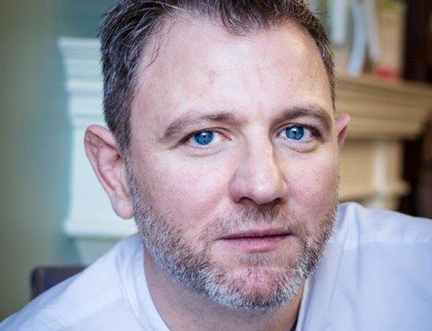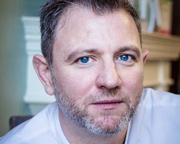Educational Freedom
By Brian Conaghan

In 2018, we commissioned 51 authors from 25 countries to write essays exploring ideas about freedom for The Freedom Papers, a publication produced in partnership with Gutter Magazine. Read on for Brian Conaghan's essay, and visit guttermag.co.uk to purchase a copy of The Freedom Papers.
Imagine an education system where students decide for themselves what they study, not in terms of subject matter, but content within that subject. Imagine an education system where teachers have the freedom to communicate ideas, inquiry or facts without being targeted for subversion tactics or violations against the Nation State’s code of practice. You can hear the soundscape of discerning voices: chaos in the corridors, anarchy in the staffrooms, confusion in the classrooms. You can picture the scene: parents, academics, clergy and political groups debating why school A is teaching Hamilton instead of Hamlet, Tempest as opposed to Tennyson and Intelligent Design over Evolution. It’s simple: we took a class vote. Chaos indeed.
Debate around academic freedom is culled at the embryonic stage because the system is underpinned by a curriculum indelibly linked to summative assessment. And final exams, as we know, determine university places. While university entry decides future prospects. And so on. Basically, the future of our society is far too valuable to afford teenagers the luxury of making their own decisions. Therefore, it could be deduced that their educational freedoms are wholeheartedly encumbered by the Nation State; the needs of the individual are usurped by the needs (and requirements) of the collective. We can’t have that now, can we?
Indeed, educational freedom is a legal construct that has been included in the European Convention on Human Rights; no one on the political spectrum would argue against compulsory education of the child in constitutional terms, the issue is quite simply how the state provides and directs that education. The pursuit of knowledge is fundamental to us – it’s the interpretation of what that knowledge consists of that’s contestable - however this pursuit should be forcibly encouraged and nurtured and not merely foisted upon us. It’s a sure thing: if you want to invite non-compliance and rebelliousness in our classrooms, restrict our youth by removing autonomy and self-determination from their learning.
As an ex-secondary school teacher, I would suggest that government curriculum control, in terms of content, is regressive; a hindrance to individual choice and personal growth. Who wants to be part of a structure that trots out tired models of rote learning and summative assessment? Surely there has to be a desire to sublimate the old directives and strive to promote a profound love of learning and enthusiasm for school?
Up and down the country schools are losing (or wasting) talent. Studies have shown that the worst performing students in UK schools are white working class boys; the numbers of this achievement wastage run into the hundreds of thousands. So, if we are to apportion blame, do we blame the individual or do we point to the system they are forced (yes, forced) to exist and thrive within? Either way it’s a shocking state of affairs. What we can assume, however, is that huge swathes of our gifted youth, not just boys, are failing to be identified and/or nurtured throughout their formative years. Huge pools of talent potentially lost forever. Naturally, this has societal ramifications that go way beyond their schooling.
Moreover, I support the view that our existing education system stifles creativity and churns out students limited in subject mastery. With everything hinging on final exams it’s apparent that teachers, and students alike, value efficiency over supremacy. Throw in time constraints and what we’re producing is waves of school leavers with an incomplete understanding of subject matter; their knowledge full of holes. A modern, innovative education system should have a certain amount of synergy with the social, political and cultural zeitgeist it exists within; it must cease to regard creative subjects as nothing more than a timetable filler and begin to fund and support them properly. And, vitally, it must put the student front and centre as stakeholders in their own process. If we truly want to remove their shackles the fact has to be acknowledged that artistic activity and developing imaginative thought is integral to learning. Just think what could be achieved by empowering these young minds with the freedom to take responsibility for their own advancement. And, by extension, integral to educational harmony and success.
This idealism is not without critique. It could be seen as a binary battle between community over individualism, especially when research has drawn us to the notion that students thrive in communal and culturally diverse classrooms. One could argue that showing how education provides the individual with intellectual freedom is actually a high stakes risk because it may endanger that very freedom it promotes; these people might become their own moral judge.
Promoting educational freedom places the individual at the axis of his/her own universe, creating a sovereign entity who is dominant within his/her own sphere of influence. History has shown us that this is a dangerous power to hold because, well, it will be wielded. When freedom is generated through absolutism it establishes new moral codes where it becomes nothing more than a delusional affectation and, thus, challenges the actual security of that freedom by pitting one against another; individual against individual and society against society. Furthermore, it cultivates an unhealthy disregard of authority, hierarchy and its structures. Schools, being microcosms of society, continue to find conflict in this.
The question of education freedom and choice can cloud judgement and remove common sense. However, the fact remains: there is no perfect system. All we know is that curiosity cannot be destroyed, it’s part of the human condition. Notwithstanding, here in Scotland we have been at the centre of cultural change for many years. For example, Education Scotland are in the process of asking schools how learners can be involved in the running of schools and its curriculum. It appears that the changes I seek are evolving and gathering apace.
I would like to see a current system where students are encouraged to use their natural talents; a curriculum that provides equal devotion to the physical, emotional, intellectual, cultural and spiritual needs of each person. A system that works in harmony with the different phases of adolescent development. Let’s see our core subjects being taught thematically, but let’s see all lessons balance the artistic, practical and intellectual.
But, then again, it’s all about the As, Bs and Cs at the end of the year, isn’t it?
Copyright © 2018, Brian Conaghan. All rights reserved.
Supported by the Scottish Government’s Edinburgh Festivals Expo Fund through Creative Scotland.


 Major new partnership with Celtic Connections
Major new partnership with Celtic Connections 

